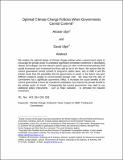Files in this item
Optimal climate change policies when governments cannot commit
Item metadata
| dc.contributor.author | Ulph, Alistair | |
| dc.contributor.author | Ulph, David Tregear | |
| dc.date.accessioned | 2014-05-24T23:01:32Z | |
| dc.date.available | 2014-05-24T23:01:32Z | |
| dc.date.issued | 2013-10 | |
| dc.identifier | 26317881 | |
| dc.identifier | d1893694-82dd-4987-a54a-bf80d662c5a0 | |
| dc.identifier | 84886592477 | |
| dc.identifier.citation | Ulph , A & Ulph , D T 2013 , ' Optimal climate change policies when governments cannot commit ' , Environmental and Resource Economics , vol. 56 , no. 2 , pp. 161-176 . https://doi.org/10.1007/s10640-013-9682-7 | en |
| dc.identifier.issn | 0924-6460 | |
| dc.identifier.other | ORCID: /0000-0003-3171-1270/work/59464538 | |
| dc.identifier.uri | https://hdl.handle.net/10023/4818 | |
| dc.description.abstract | We analyse the optimal design of climate change policies when a government wants to encourage the private sector to undertake significant immediate investment in developing cleaner technologies, but the relevant carbon taxes (or other environmental policies) that would incentivise such investment by firms will be set in the future. We assume that the current government cannot commit to long-term carbon taxes, and so both it and the private sector face the possibility that the government in power in the future may give different (relative) weight to environmental damage costs. We show that this lack of commitment has a significant asymmetric effect: it increases the incentive of the current government to have the investment undertaken, but reduces the incentive of the private sector to invest. Consequently the current government may need to use additional policy instruments – such as R&D subsidies – to stimulate the required investment. | |
| dc.format.extent | 16 | |
| dc.format.extent | 609044 | |
| dc.language.iso | eng | |
| dc.relation.ispartof | Environmental and Resource Economics | en |
| dc.subject | Climate change | en |
| dc.subject | Emissions taxes | en |
| dc.subject | Impact on R&D | en |
| dc.subject | Timing and commitment | en |
| dc.subject | SDG 13 - Climate Action | en |
| dc.title | Optimal climate change policies when governments cannot commit | en |
| dc.type | Journal article | en |
| dc.contributor.institution | University of St Andrews. School of Economics and Finance | en |
| dc.identifier.doi | 10.1007/s10640-013-9682-7 | |
| dc.description.status | Peer reviewed | en |
| dc.date.embargoedUntil | 2014-05-25 |
This item appears in the following Collection(s)
Items in the St Andrews Research Repository are protected by copyright, with all rights reserved, unless otherwise indicated.

